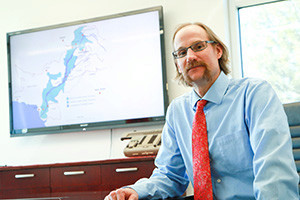
Due to its economic, climate and population challenges, Pakistan’s water crisis could go from bad to worse.
The Middle Eastern country nestled between Afghanistan and India could become a “water-starved” country in the next six to seven years, according to the country’s minister for water and energy, Khawaja Muhammad Asif. A 2013 report from the Asian Development Bank called Pakistan “one of the most water-stressed countries in the world.”
University of Utah civil and environmental engineers are working to change that.
The United States Agency for International Development (USAID) announced that the University of Utah has partnered with the Mehran University of Engineering and Technology in Jamshoro, Pakistan, to create a center to research and develop solutions for water problems plaguing Pakistan.
The USAID-funded Partner Center for Advanced Studies in Water will be headquartered at the U with another office in Mehran University. U Civil & Environmental Engineering Associate Professor Steven Burian will become director of the center, which is receiving $10 million in funding over five years. It has not been determined which U building the center will be housed in, but research from the center has already begun.
“This is the most exciting project that I will likely work on in my career, and it’s because of the fact we are representing the university and the United States,” Burian said. “We have so many people involved from across campus, and engineering is the lead. We are doing things where we will see real impact. It’s going to be incredible.”
The center’s research will focus on topics such as treating and reusing wastewater, desalination, storage and irrigation efficiency, flood control, water quality management, public health protection, climate resiliency, water governance, and community-based solutions. But it also will look at how the country’s social, economic and political factors affect the country’s water resources. Michael Barber, chairman of the U’s civil and environmental engineering department, who also will be working at the center, says research they do to aid Pakistan will also benefit the rest of the world.
“There are all sorts of challenges that will direct our research,” he said. “Desalination is a worldwide problem, and we want to help them develop technologies that might be applicable to anywhere. Yes, it will help Pakistan, but yes, it could help Southern California.”
Meanwhile, the center also will have an educational component. A curriculum in water research will be developed, and there will be student exchange programs between both offices, as well as scholarships and community outreach programs.
“That to me is one of the exciting parts, that our students and our faculty will get to learn about cultural challenges and integrate the economics and societal challenges into a project,” Barber said. “We’ve got to think differently, we have to expand our views.”
While the U’s civil and environmental engineering department will lead the operation of the center, it will involve faculty from many disciplines, including researchers in biology, geology, geophysics, law, political science and public health. In all, 17 University of Utah professors will be involved, including four from civil and environmental engineering.
Read the full press release in the U News Center.